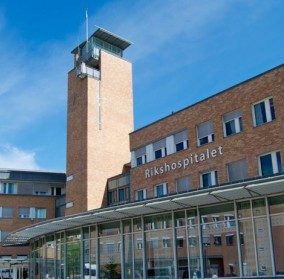UPDATED: Norwegian medical experts probing the cause of internal hemorrhaging in three vaccinated health care workers have found a link to the AstraZeneca vaccine they’d taken. They believe the vaccine unleashed such a powerful immune system response that it led to blood clotting.

“The reason for our patients’ conditions has been found,” Dr Pål Andre Holme, a professor and leader of the neurology department at Norway’s national hospital Rikshospitalet, told newspaper VG Thursday.
He and his colleagues have been treating three Norwegian health care workers, all previously healthy and under the age of 50, who developed blood clots and internal hemorrhaging after being injected with the AstraZeneca vaccine. One of them, who’d worked at the hospital in Lillehammer, died from a cerebral hemorrhage last weekend.
Yet another female health care worker in her 30s, also injected with the AstraZeneca vaccine, suffered a cerebral hemorrhage a few days earlier. She was from Tynset, a small mountain community south of Røros. She was flown to Oslo for emergency care but died last week.
Holme had said on Norwegian Broadcasting (NRK) earlier this week that he and his team at Rikshospitalet thought it was “more likely than unlikely” that there was a link between the vaccine and the hemorrhaging. Norway had already suspended use of the AstraZeneca vaccine and several other countries in Europe did so as well after discovering some suspicious side-effects.
Intensive work
The group of medical experts at Riskhospitalet, led by Holme, have worked intensely this week to find out why otherwise healthy, relatively young people had to be hospitalized with serious blod clots, all of whom had taken AstraZeneca’s vaccine. The medical experts had a theory that it unleashed an unexpected reaction by their patients’ immune systems, that in turn triggered a combination of blod clots and low levels of blood platelets.

“We have findings that can clarify our patients’ clinical condition,” Holme, a professor of medicine at the University of Oslo, said at an early afternoon press conference held just outside the hospital’s entrance. “The findings support our theory, that these patients have had a strong immune system response that led to the formation of antibodies that can infect blood platelets and lead to a blood clot.”
He’d earlier told VG that the response “most probably came after the vaccine.” He said the team worked in cooperation with the section for advanced coronary thrombosis immunology at the University of Northern Norway, and they had “now uncovered specific antibodies against the blood platelets that can yield a picture we recognize from other parts of medicine, when medications are the cause.”
Asked why he used the term “most probably,” Holme told VG that “we have the reason (why their patients became so ill). And there are no other things than the vaccine that can clarify that immune system response.” None of the patients had any medical history that could explain such a strong response, he added. “I’m absolutely certain that these antibodies are the cause,” Holme said, “and see no other reason than the vaccine unleashing it.”
At the press conference he also said that he saw “no other” causes for the response at present. He said he had no theories as to why these patients responded as they did, when so many others have not. Their work is continuing. “These are just the first findings that support what we think caused this,” Holme said.
Few cases of such side-effects
VG reported that around 120,000 Norwegians have so far been vaccinated with AstraZeneca. There have been very few cases of suspicious side-effects among the nearly half-million Norwegians vaccinated in total so far.
Holme told VG that vaccines are taken to prod an immune system response against what the body needs for protection. “Then we develop antibodies,” Holme said. “Some antibodies can thus react such that they activate blood platelets, like in these cases, and trigger a blood clot.” Other antibodies can be “removed from circulation,” resulting in levels that are too low.
All three patients who were rushed to Rikshospitalet late last week had similar symptoms: acute pain, blood clots in unusual place such as the stomach and brain, and all had internal bleeding and low levels of blood platelets.
European evaluation looms
The European Medicines Agency (EMA), of which Norway is a member, was meeting Thursday to evaluate use of the AstraZeneca vaccine, which already has been injected in millions of people without known problems. It later endorsed the vaccine despite its recent side-effects, saying that its benefits of protecting against the Corona virus outweighed its risks. Now it will be up to national authorities to make their own decisions regarding use of the vaccine.
Asked why the Rikshospitalet/UNN team opted to release their findings so quickly (just as the EMA was meeting), Holme said “we think that it’s important this comes out, that we have found a possible clarification” to the blood clotting and at least one of the two deaths. He wouldn’t comment on whether he thinks use of the AstraZeneca vaccine should be halted permanently, at least in Norway. They are continuing to examine why the Norwegians under their care got so sick.
Norway’s public health institute FHI, which is responsible for the country’s vaccination program, will be making its own, independent evaluation of whether to resume use of the AstraZeneca vaccine. It decided to continue its “pause” also after the EMA endorsed it Thursday, with a conclusion expected next week.
Steinar Madsen of Norway’s state drug administration (Legemiddelverket) told VG he’d been oriented about Rikshospitalet’s findings of strong immune system reaction to the vaccine, and he later acknowledged the connection to the vaccine. The findings “will be considered to a high degree,” Madsen said, in his agency’s conclusion about AstraZeneca. “Norway has made a solid contribution towards finding out what’s going on here.”
NewsInEnglish.no/Nina Berglund

